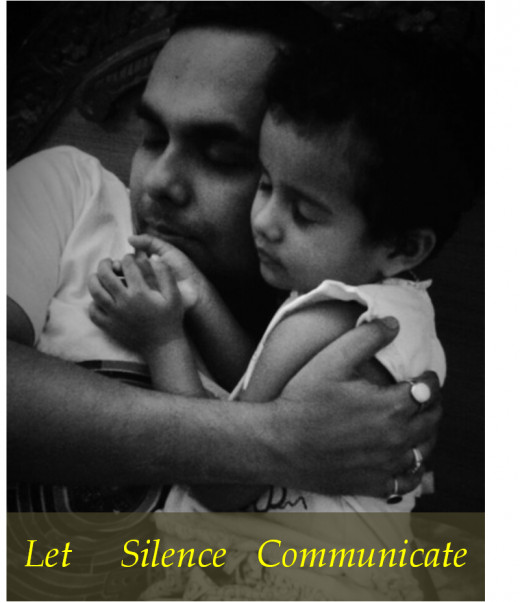Let Silence Communicate

A Look at Silence
The dictionary defines silence as complete absence of sound and speech. Silence is stillness, it says. Silence in nature is not without sound. But that meaningful silence calms us down.
Visualizing ourselves in the woods rejuvenates and helps us de-stress. In our daily lives, the ever increasing decibel levels make us look for silent corners. There’s noise everywhere and that’s why the search for silence becomes critical.
Silence as we’ve all experienced, can express so many different emotions in interactions and non-interactions. Silence can be as powerful as speech. It can strengthen relationships and build trust. It can also disrupt or break communication. To understand silence we need to look at its dichotomy and understand the context in which it's used.
Silence also means different things in different cultures. How an Asian interprets or values silence is completely different from how an American or a European perceives it.
Let's try to understand the vast, profound, intriguing and beautiful phenomenon called silence, by starting with a look at its positives.
A Marketing Manager Says
"What I can now see is that 90 % of what comes out of people’s mouth is not very original, or even helpful, or even worth listening to. Most of what they say is gossip, the stolen opinions of others, things they have picked up in life,bias, judgement, something they have read about somewhere, a whole load of substantiated stuff. I occasionally do not feel like joining the conversation”.

The Positives of Silence
Silence to heal
There are times when you need silence—for yourself. You want to spend a few minutes or days avoiding faces. It hurts to speak. It hurts even more to listen. You simply can't bring yourself to enjoy mindless chatter. Your friends leave you alone. Your family simply tolerates you during this time. Why? Because you need time to reflect. You want to heal. You want peace. And being silent helps you achieve that.
Silence to reflect
In the workplace, you need silence.Think of a day when you need to make a sales presentation to impress the stakeholders. Think of a day when you design interfaces that will be a customer's delight. Think of those days, when you create copy for the new ad campaign that will increase product visibility and revenue.
On all these days, you need silence to think.
Yes, silence in the workplace can be golden.It helps to organize your thoughts. It facilitates decision making and analytical thinking. It also helps creativity to blossom.
Silence to listen and appreciate
Speech as we all know plays a major role in determining responses in interpersonal communication. Those who are able to express their feelings fluently in words are admired and well-received. Eloquence is a much admired quality and a great asset. But have you ever wondered what makes someone eloquent?
Apart from excellent verbal communication skills, you’ll notice something else. You’ll realize that there is a group of listeners who are silent. These listeners brand the speaker as a good communicator. And the speaker in turn listens to their feedback and improves constantly to reach a point of excellence.
A Friend Says
" I was listening to him. He went on and on about his financial troubles. I said, I was sorry to hear that and continued to listen. He suddenly turned around and told me that he was contemplating suicide. I was shocked. I persuaded him to reconsider and not end his life at any cost. He listened for a while. Unsure of what to do next, I informed his family.They talked him out of it. When I met him last time, he thanked me. He said, I saved his life."

Silence to resolve conflicts
Have you ever resolved conflicts with colleagues or managers? Have you ever resolved conflict within your family? How did you do it? Did you talk? Or did you listen? Listening can help dissipate anger. It allows the speaker to calm down. It allows the listener to understand the speaker's point of view. This leads to mutual understanding and conflict resolution.
Silence to negotiate
Have you ever used silence to negotiate? I've, unintentionally. Let me tell you how.
Yearly appraisals were happening in our company. After my manager’s rating, we sat down for a face-to-face discussion to discuss my rating. During that conversation my manager asked, if I was okay with my appraisal rating. I didn’t say a word. So my manager asked, if I was unhappy about my rating. Was there something he would do to help me?
You see during this conversation I only paused for a few seconds, when a question was asked. And that pause was an answer. It was as effective as saying, “Yes, I’m not happy with my appraisal.” This incident helped me realize that silence when used appropriately can be an effective tool for negotiation.
Silence to build and promote relationships
You must listen silently when someone talks. This is so simple to write and say. But it's hardest to follow. I've heard so many people complain that they are never trusted with information. They are always taken by surprise. Friends never trust them with their secrets. And their family confides to someone else. For all those who complain of these, the answer lies in practicing silence. Be silent and listen. Forget about yourself for a while. Listen and then talk. You'll not appear self-centered anymore. You'll be perceived in a different light. And this will build your credibility as a friend, parent or partner.
Silence to gain
Let's look at someone who is selling a product or service or an idea to a customer. After completing a walk through, the speaker or the presenter will pause to ask if the customer has any questions. At that point, if the listener or the customer continues to remain silent, there's a fair chance that the speaker will provide additional information, or a better deal. Silence when used strategically can improve one's chances of gaining an advantage.
Silence to refuse without causing hurt
If someone is being pushy or overtly inquisitive and that makes you uncomfortable, you can use silence to show your discomfort. Using silence can save you from getting into an unpleasant situation or an argument. But draw a line if you're perceived as a pushover. In case you face such a situation, express your disapproval verbally.
Silence - Valued or Devalued?
Year
| Event
| Place
|
|---|---|---|
2004
| Proposed a bill to ban car alarms as a public nuisance
| New York
|
2009
| Housing Survey reveals 25% Americans are bothered by noise
| U.S.
|
2000
| Law passed to regulate noise pollution. Rendered ineffective due to laxity in implementation.
| India
|
2009-10
| Westminster Council recevied 9,814 grievances about noise, which equates to 42.32 complaints per thousand residents
| U.K.
|
Read This if You're Intrigued by the Use of Silence in Today's Noisy World

A Wise Person Says
"I have the feeling that sometimes it is better to keep my mouth shut, especially when I am angry because after the heated moment has passed, I cannot take back the negative things that have been said. I usually come back to the conflict issue when I am in a better frame of mind."

The Dichotomy of Silence
The positives of silence can very well become its negatives. It's this Jekyll and Hyde like character of silence that makes it so powerful and intriguing.
- Silence heals. In the same way, silence can be used to cause hurt and pain.
- Silence is used to reflect. And silence can be used to waste time.
- Silence is used to listen and appreciate. And silence can be used to block information and tease.
- Silence is used to resolve conflict and negotiate. Silence can be also used to show anger, disagreement and discontent.
- Silence can be used to build relationships. Silence can be used to break a relationship by ignoring and isolating someone.
- Silence can be used to reveal information and provide an advantage to the listener. In the same way, silence can be used to hide information.
- If you're on the other side of the table, i.e. if you're the speaker, don't feel pressured to spill your beans or offer a better deal when the customer refuses to speak.
The context of silence
Silence gets further intriguing with the addition of a new dimension - the context. To put it simply, every time we try to understand the implication of silence, we need to ask - in what context silence was used?And the answer to this question can be wide ranging. For example, in a husband-wife relationship, one can use silence to get out of an abusive relationship. On the other hand, someone can use silence to abuse or manipulate. In the same way, in a manager-reportee relationship, someone can use silence to dominate and someone can use silence to revolt. The context in both the examples is the nature of relationship and place. The place in the first case, is family or home. In the second case, it's the workplace.

The Cultural Context of Silence
The context of silence leads us to the next dimension in understanding silence - the cultural interpretation of silence. What silence means in the East (the silent East) is different from what it means in the West (the eloquent West). Silence in Asia is valued rather than feared and it's accepted as part of social behavior. Whereas silence in America, Europe or Australia is considered socially disagreeable. Here are some insights into understanding silence in Asian cultures like Japan and India as opposed to Western cultures like America.
- Historically in Japan, silence has been associated with truthfulness. This belief originated in Zen Buddhism, where the spoken word was discouraged and silence was encouraged because it was believed that enlightenment could not be attained by talking about it. Moreover, Buddhist chants enabled people to realize the emptiness of words.
- On the intra-personal level, truthfulness is related to the idea of a person's inner (private) and outer (public) realms. The outer realm of a person concerns one's outer body, which includes one's speech organs and verbal expression, while silence is associated with the inner realm, which the Japanese equate with truthfulness.
- In Japan, one is very aware of non-verbal communication as a social event. It's very important to care about (kiwo tsukau) and to understand (sassuru) others.Japanese are more concerned with the needs of others. This hold true for countries like India as well. Where there's more concern about others during communication.
- In countries like Japan and India, individuals are expected to be polite in public. This politeness is equated with the maintenance of a positive image in society.
- Similarly in India, there's emphasis on practicing silence at a personal and community level. For example, in Indian villages - when the village elders talk - the villagers listen in silence. In a household, when elders talk, the younger people are supposed to remain silent and listen. Questioning is interpreted as showing disagreement and is discouraged. Silence is a way of showing respect to authority, patriarchy and age.
- In Hinduism, just like in Buddhism, practice of silence is highlighted.
- In Japan it's culturally expected that husband-wife relationships will place more emphasis on non-verbal communication. They believe that only through silence can the truthfulness of any relationship be established. And any public display of emotion is considered embarrassing.
- The emphasis on non-verbal means to communicate extends to all relationships like colleagues, friends, etc.
- Silence in Japan signifies defiance or disagreement. If someone disagrees, they remain silent. Because more than showing disagreement, there's emphasis on preserving the harmony of the group. And that's not jeopardized by arguments.
- Japanese and American cultures can be understood in terms of individualism and collectivism.
- Individualist cultures emphasize the goals of the individual, whereas collectivist cultures stress group goals over individual goals. In this sense, Japan is a collectivist culture whereas America is an individualist culture.
- In an individualist society, there is a need to be accepted by others. Whereas in a collectivist society such as Japan's that has active group consciousness, there is no such need for acceptance by others.
The focus on silence in Japanese culture influences their interaction with the rest of the world. And the focus on verbal communication and the use of rhetoric in America influences their interaction with the rest.
Find Out More on Silence in Cultures
Using Silence:pause for Effect
To end this discussion, let me leave you with some easy and practical ways to use silence in communication. The use of pause in your daily conversations or business presentations can help to engage your audience, convey emotion and allow your mind to catch up with your mouth. Here's how you can pause for effect.
- Pause for 3 seconds after each sentence.
- Pause instead of using filler words like, um, uh, etc.
- Pause when there's a comma, period, exclamation or question mark.
- Pause between paragraphs.
- Pause before and after using a key word.
- Pause when you ask a rhetorical question.
- Vary the length of your pause. Your comma pause should be shorter than your period pause.
Conclusion
- Silence in cultures shouldn't be stereotyped. Silence is also felt and expressed at an individual level. So we'll find Japanese or Indians who're talkative and Americans who are silent.
- How an individual perceives silence is a result of his environment and attitude.
- Silence can be used to show respect (in a funeral or to honor patriots and martyrs). Silence can express love and bonding. Silence can be golden for some, and it can be deadly for someone else. Understanding silence is thus critical. So that we stop fearing it and are not confused by it.
- When we understand and interpret silence correctly, the misunderstanding and negativity created through silence will be reduced.
- It will also better interpersonal and intercultural communication. And improve the overall quality of communication.
Tell Me
What is the most intriguing part of silence?
You may like:
- 14 Amazing Truths Learned From Those Who Left Or Lost Their Jobs
Losing one's job or leaving it for an uncertain future is tough, not to mention stressful and depressing. So I was naturally surprised when I heard -- this. - Distance Education In India: Your Complete Guide
The guide covers: list and details of 10 distance education universities; top 10 distance education universities for MBA with accredition and fees; the good and bad of distance education and more.
Listen to the Sound of the Woods and Connect with Your Inner Self
Sources
An Exploratory Study of the Role of Silence in Business Communication, Dr. Zsuzsanna Zsubrinszky
Communicative Functions and Meanings of Silence: An Analysis of Cross-Cultural Views, Wong Ngan Ling
http://www.aijcrnet.com/journals/Vol_2_No_4_April_2012/1.pdf
http://www.preachingtoday.com/illustrations/2011/july/4071111.html
http://en.wikipedia.org/wiki/Noise_pollution#Impact_in_the_United_Kingdom
http://www.uri.edu/iaics/content/2003v12n3/08%20Robert%20N.%20St.%20Clair.pdf
http://eview.anu.edu.au/anuuj/vol3_11/pdf4/ch02.pdf
© 2014 Chitrangada Mukherjee





